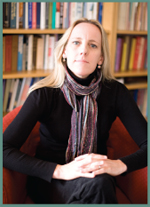People see what they want to see. That is, until they see the light.

WHILE I DO love to quote people who say profound and entertaining things, I’m not normally one for adages. But here’s one that’s apropos: people see what they want to see. That is, until they see the light. (You can quote me on that!)
But this seeing is a fluid thing, as the writer/performer Kelly Carlin will tell you. Fans of George Carlin will no doubt be enlightened by his only child’s story, which she adapted from the keynote speech she entertainingly delivered at the American Humanist Association’s annual conference last May. (It’s also the basis of her soon-to-be published memoir, A Carlin Home Companion: Growing Up with George.) In it, Kelly describes a journey to find her authentic self. You see, the great truth-teller George Carlin was her “sky god,” and when he died, she set out to reorder her universe.
On the April 27 episode of her wonderful podcast, Waking from the American Dream, Carlin talked about the upcoming keynote speech. She noted that what she’d learned about humanism and the AHA strongly resonated with her, but expressed trepidation with the “atheist” label. It seems that after her dad died in 2008, atheists were very vocal about their adoration and she was surprised that so many identified George Carlin as “one of them.” The irony that Carlin would be worshipped by atheists wasn’t lost on his daughter, nor was the fact that he was famously wary of groups (as is she). “I hate a group of people with a ‘common purpose.’ ‘Cause pretty soon they have little hats,” he said in one of many similar riffs on the theme. “And armbands. And fight songs. And a list of people they’re going to visit at 3 a.m. So, I dislike and despise groups of people but I love individuals.”
Who knows if George Carlin would have ever attended a humanist conference, but we’re lucky Kelly did. “I’m technically an atheist, for sure a humanist,” she said at one point on Waking from the American Dream, pondering the similarity of her discomfort with either label to that of women who support everything feminism stands for but avoid calling themselves feminists.
Years ago at a used bookstore, I picked up a slim little book called Hypocrisy and Humor (1960) by E. J. Oliver. Opening with the claim that “the first human was the first hypocrite,” Oliver name-drops Cervantes, Aesop and Petronius, the Gospels, Erasmus, Swift, Moliere, and Evelyn Waugh, and then assures us his is no mere “conducted tour” of satirists and humorists. (It’s certainly not complete without George Carlin on the list.) “The choice of masks cuts deep,” Oliver writes. “A dog, it has been said, does not conceal his love-making, but a god conceals even his existence.” Humans are somewhere between the two, the author contends.
The point I’m trying to make is that contradicting ourselves is both absurd and part of being human, but in striving for authenticity we avoid hypocrisy. And authenticity—and, of course, humor—is what the Carlins are so good at. For Kelly, as she described it on her podcast, it means being in the “I-don’t-know business,” playing on the playground where reverence is followed by a good fart joke, and where she tries to “play all the keys on my piano” and “own every voice inside my head.” This open-mindedness and allowing for uncertainty, even about one’s own ideas, is part of living authentically and it can bring joy to the self and others, Carlin contends. Sure sounds like humanism.
